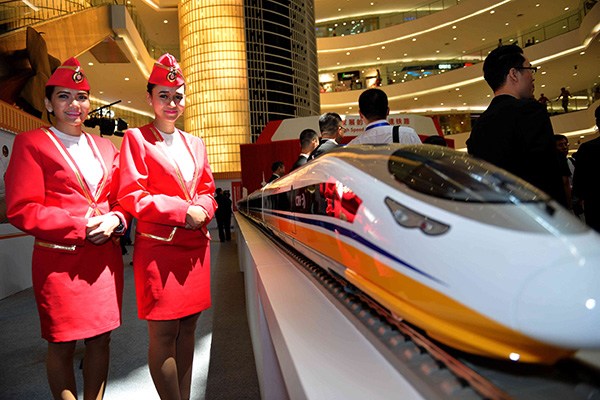
As a result, China Railway Rolling Stock Corp, the country's largest train manufacturer, plans to deploy more resources and manpower in the global high-speed rail equipment market, especially in developed economies such as the US or the United Kingdom to fuel robust growth over the next decade.
CRRC was formed by the merger of China's former top two train manufacturers, CNR Corp and CSR Corp, last year, a major step that the Chinese government took to accelerate reform of its behemoth State-owned enterprises, in a bid to push them toward gaining more overseas projects.
Yu Weiping, CRRC's vice-president, said the company is ready to contribute to a new high-speed rail culture in the US, after it invested $60 million to build a new manufacturing facility to produce railcars in Springfield, Massachusetts, last year, after sealing a deal with the Massachusetts Bay Transportation Authority to design and supply 284 railcars for the Boston transit system's Orange and Red lines.
"With high-speed trains traveling at a speed of more than 300 kilometers per hour, it will help the US to change the situation of that country's ground commuting systems that have long been dominated by automobiles," said Yu.
The entire range of CRRC's products, including diesel locomotives, electric multiple units and light-rail vehicles, has been exported to nearly 100 countries and regions.
Yu said the company's next step is to gradually switch focus from product exports to capital and technology exports in the global market.
CRRC is preparing to export bullet trains for a high-speed rail project in Russia that would connect Moscow to Kazan. The length of the line is expected to be about 770 kilometers and will run through seven Russian regions with a total population of more than 25 million.
The Chinese company has 46 wholly owned or holding subsidiaries and more than 170,000 employees. It has already built manufacturing facilities and maintenance centers in Malaysia, Turkey and Brazil.
Sheng Guangzu, a deputy to the National People's Congress and general manager of the China Railway Corp, the country's railway service provider, said the Belt and Road Initiative will help China export more high-speed rail technologies and related products to a number of lucrative markets during the country's 13th Five-Year Plan (2016-20).
The initiative, proposed by China in 2013, is a trade and infrastructure network that includes the Silk Road Economic Belt and the 21st Century Maritime Silk Road.
The planned network connects Asia, Europe and Africa and passes through more than 60 countries and regions.
"China will quicken the pace of promoting its railway standards abroad, especially in the markets along the Belt and Road Initiative," said Sheng.


















































